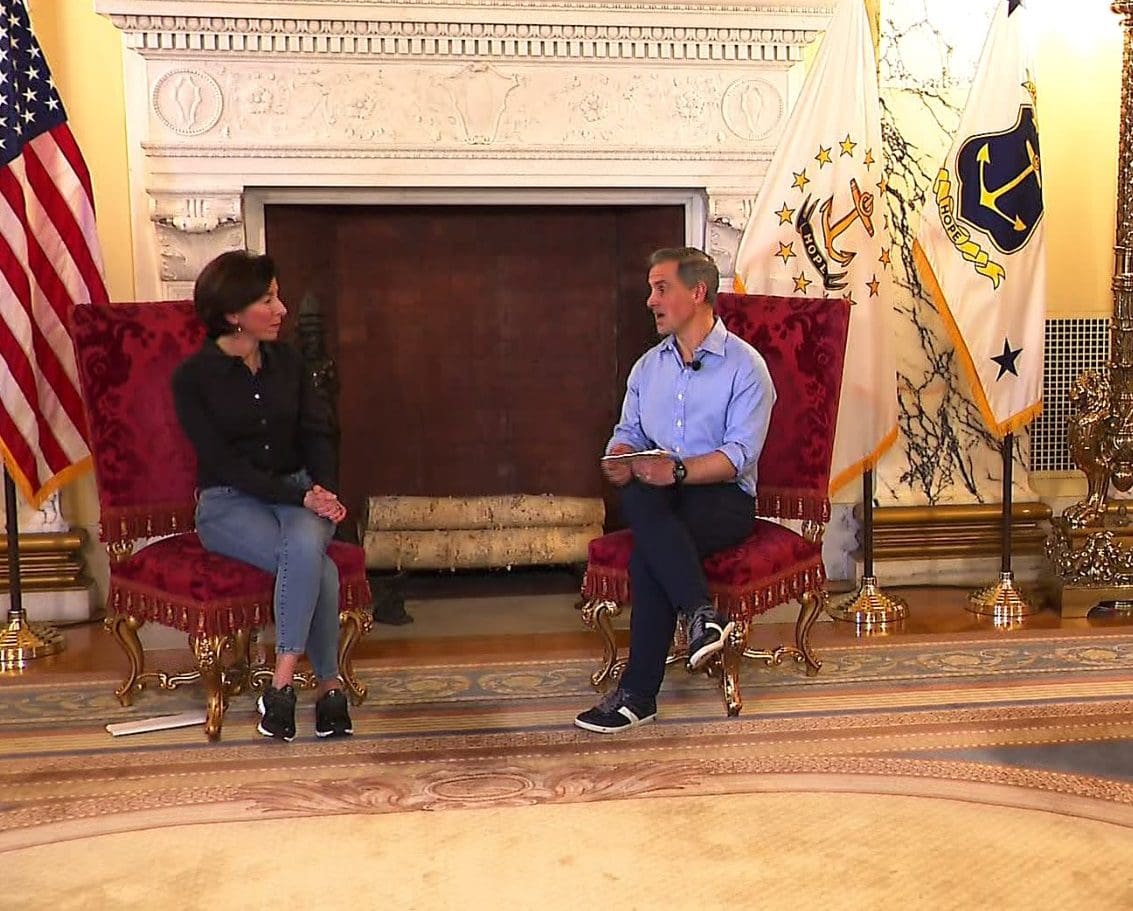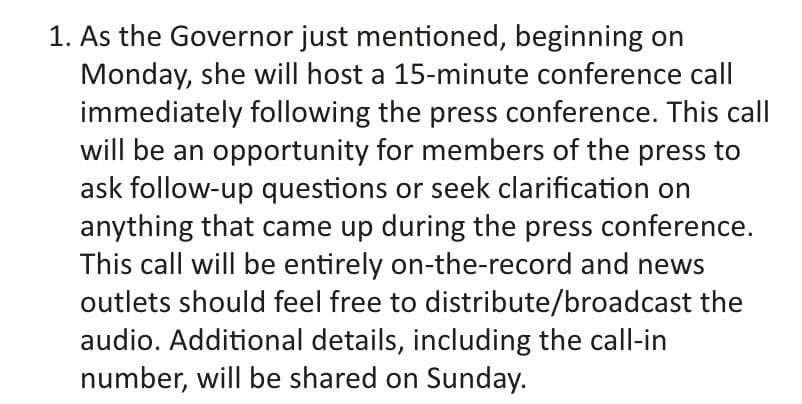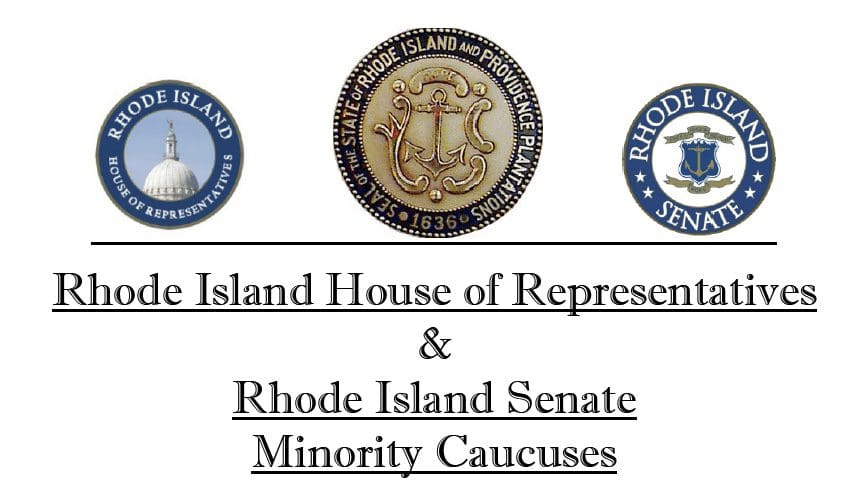Search Posts
Recent Posts
- Vinny Paz to be inducted TODAY into the International Boxing Hall of Fame – CES Boxing June 7, 2025
- In the News… quick recap of the week’s news (6.7.25) June 7, 2025
- Burn with Kearns: Strong without the spend: How scraps became strength tools – Kevin Kearns June 7, 2025
- Rhode Island Weather for June 7, 2025 – Jack Donnelly June 7, 2025
- How to advocate for threatened properties: The Heritage Alliance of Pawtucket June 7, 2025
Categories
Subscribe!
Thanks for subscribing! Please check your email for further instructions.

News Media & House/Senate Minority Caucuses make requests of Governor Raimondo
(Photo: Gov. Raimondo & First Gentleman hold children’s talk this week)
Two groups are calling upon Governor Raimondo to open up the crisis management bunker to bring in the media and the RI Legislature.
Currently, Governor Raimondo has daily availabilities at 1pm where she speaks from a podium in a room with 4 or 5 others, one usually being Dr. Scott or Dr. McDonald from the RI Dept. of Health – others either from CommerceRI, RIDE, etc. There is an sign interpreter and RI Capital TV’s Margie O’Brien.
After the Governor speaks a computerized form allows reporters to type in two questions from their remote locations. Usually, the Governor takes 4 or 5 of these questions which are read by O’Brien.
Recently, members of the media have started to question the necessity of banning media from the room and are asking, via Twitter, for the Governor to open up that process, similar to how the President or Gov. Cuomo, Gov. Baker, etc. have their news conferences – with reporters sitting 6 feet apart from one another. There have also been suggestions to hold a longer news conference by Zoom or Skype or some video remote method, where people could watch and listen to a more indepth presentation and follow-up responses.
The Governor’s response has been to offer a conference call after the press conference, for members of the media. Details will be sent to the media today and the first event of this kind will begin with the Monday event. Media have been told that it will be a 15-minute phone call. Several members have expressed their frustration, publicly, about this, including RINewsToday. We will keep readers posted on this situation.
Here is the plan sent to the media by the Governor’s PR office:

The second group which has been raising their voice louder over the past weeks has been the Minority Caucuses of both House & Senate who have asked to come back into session, virtually. The Governor has responded that the state is in crisis mode, and she will determine when the legislature should meet again – even remotely.
The full House & Senate Minority Caucuss have sent a letter to the Governor – we reprint it here:
House and Senate Minority Caucuses Call for Immediate Continuity of Legislative Operations Plan
Rhode Island House and Senate Republicans are calling for an immediate continuity of legislative operations plan from Governor Raimondo, Speaker Mattiello and Senate President Ruggerio. The letter, signed unanimously by both House and Senate Minority Caucuses was sent electronically to all General Assembly members on Sunday, March 29, 2020.
The letter was sent to: Hon. Gina Raimondo, Governor of the State of Rhode Island; Hon. Nicholas Mattiello, Speaker of the House of Representatives of the State of Rhode Island; and Hon. Dominick Ruggerio, President of the Senate of the State of Rhode Island.
Dear Governor Raimondo, Speaker Mattiello & President Ruggerio:
On behalf of all Rhode Islanders, thank you for your leadership during this unprecedented COVID-19 pandemic, especially given the ever-changing dynamics of this crisis. Two short weeks ago we were conducting the government’s transparent business as contemplated by our Constitution, laws and customs. Today, our People are governed by Executive Order and debt-financing through the four members of the Disaster Emergency Funding Board (DEFB). This form of government must only exist if time or circumstances do not permit otherwise.
Going forward, we now have the time to execute a plan of action that will enable the People’s representatives in the General Assembly to hold limited and necessary committee hearings and House and Senate sessions. Now is not the time to eliminate legislative participation. Rather, Rhode Island will benefit with the inclusion of more voices and ideas as we navigate these uncharted waters. Please know House and Senate Republicans are committed to work with your respective offices to ensure orderly and expedited processes, debates and votes.
Legislative Leadership should immediately establish and communicate a plan of action that will enable the General Assembly to meet and take necessary action on the critical issues we face. The Rhode Island General Assembly must meet its constitutional obligation to pass a balanced budget, Art. IX, § 16, and approve all local and private appropriations pursuant to Art. VI, § 11. We must reconcile the loss of gambling and other revenues, and craft emergency relief for small businesses and families.
Importantly, our municipalities, which are now meeting to craft their own budgets, and successfully utilizing alternative venues such as video conferencing to do so, all require clarity about the level of municipal and school aid they should expect to receive from the state. The failure to provide prompt, thoughtful, and responsive direction to our municipalities will have significant and harmful ramifications throughout our state.
While the $300 million debt-authorization last week by the DEFB was prudent, going forward, this critical legislative authority and decision-making process must remain with the full membership of the General Assembly, not select Legislative Leadership.
Laws governing this year’s elections will likely need to be revisited in response to this pandemic. Candidate declaration and nomination periods and processes may have to be changed, and the Board of Elections and the local boards of canvassers may require reforms and additional resources to respond to the anticipated mail ballot onslaught. Our duty is to vet any proposed changes to our electoral system before the election season begins at the end of June.
Lastly, and most important to our constitutional republic, is that the Rhode Island General Assembly must be able to meet in response to this declared state of emergency. Pursuant to R.I.G.L. § 30-15-1 et seq., the Governor’s March 10, 2020 Executive Order 20-02, declaring a state of emergency, imbues the Office of the Governor with immense power to restrict the freedoms of Rhode Islanders.
While Governor Raimondo’s performance thus far has been exemplary, our General Assembly is the necessary check and balance on this nearly unbridled authority. Specifically, the General Assembly is empowered by R.I.G.L. § 3-15-9(b) to end or modify this declared state of emergency.
We must ensure the People’s representatives in the House and Senate are able to meet to analyze, and perhaps curb, the Governor’s authority under this state of emergency, in the unlikely event that need ever arises – as is the General Assembly’s solemn obligation.
These critical aspects of the People’s business must go on so long as the Rhode Island General Assembly can safely convene. We are gravely concerned by the recent comments from Legislative Leadership indicating that legislative sessions may not recommence until January, 2021. This is unacceptable if the General Assembly can safely meet. Thankfully, the General Assembly is able to safely convene for limited business, and we provide the following non-exclusive options:
Option 1: Remote Meetings
Robust technology exists for committees, the House, and Senate to conduct business remotely, as Pennsylvania, New Jersey, and South Dakota have recently begun, and numerous other states now consider.
Online platforms such as zoom.us allow control of a meeting by committee or chamber chairs, with full online public viewing capabilities. Online witness presentations may be offered, and members may ask questions and fully participate.
If Legislative Leadership deems online public testimony to be unwieldly, Capitol TV can set up a mobile camera station in the Statehouse parking lot, where witnesses can offer live testimony from their cars, or walk up testimony, which will be live-streamed directly to a committee and the public through our chosen online platform. Since Capitol TV can livestream on our modern phones, witnesses can observe the proceedings until it is their turn to drive up and offer testimony.
In the event a witness does not have a modern phone, Capitol TV can broadcast our proceedings to the entire state over the traffic advisory channel, 1630AM.
Alternatively, JCLS can invest in a $350.00 low-band FM transmitter, which will broadcast the proceedings to all FM radios within an approximately 1-mile radius.4 Capitol TV can also set up an outside viewing station, where proper social distance will be maintained, for those without smart phones or radios. Such live testimony would be in addition to our regular public engagement from letters, email, and phone calls.
Committee and floor votes can be taken via voice or video (where members could hold up red or green cards signifying their vote), and which will be witnessed and certified by the clerks of the respective committees and chambers, with each member affirming that they voted freely and without coercion.
Option 2: Utilization of the Dunkin Donuts Center (the Dunk)
Committees, the full House and Senate, and staff may utilize this large vacant arena to meet and maintain appropriate social distance, far in excess of the six-foot minimum. A reserved parking area with direct access to the Dunk may be utilized to ensure appropriate social distance is maintained at all times.
Expert and administration witnesses may provide live testimony, or at the Chair’s discretion, transmit testimony to the Dunk via Capitol TV from the Statehouse or other designated locations. As with the remote meetings proposal (above), Capitol TV can set up a mobile station in one of the large adjacent Dunk parking garages for drive-up and walkup testimony, broadcast the proceedings over Capitol TV and 1630AM (or similarly invest in a low-band FM transmitter), and also set up a remote outside viewing station, to enable robust public testimony to be streamed directly to committees.
Out of an abundance of caution, if leadership still believes that the substantial social distance afforded by the Dunk does not provide an adequate measure of safety, JCLS can go to the great length of purchasing high-quality personal protection equipment (PPE) masks. The cost to invest in 150 high-end Mira Safety PPE masks, with appropriate air filters, for all House and Senate members and key staff, is approximately $45,000.00, or .098% of this year’s $46,000,000.00 JCLS budget.
The suggested Mira Safety PPE mask is simple to use, with a speech diaphragm facilitating verbal communication, and an internal drinking system (so the mask does not have to be removed). JCLS can also hire a cleaning company, such as Pawtucket’s Atalian Global Services (that just disinfected the statehouse), to disinfect common areas, such as bathrooms, while the Dunk is utilized. While we believe this added protection may appear remarkable, it is not nearly as extreme as our General Assembly failing to convene when it is possible to safely do so.
We have presented merely two suggestions that will enable the General Assembly to perform its constitutional functions. If one of these options, or a combination thereof, is not satisfactory, there are many other locations, levels of PPE, and technology that can be deployed to ensure safe meetings. We are happy to discuss other potential arrangements that will enable the General Assembly to safely convene and meet the challenges we face.
We implore the Speaker of the House of Representatives and the President of the Senate to immediately coordinate the logistics that will enable the Rhode Island General Assembly to safely assemble and meet its constitutional responsibilities, and to forthwith assure the public that we will seek to convene prior to the new budget year, the candidate declaration period for the 2020 election, and with sufficient time to respond to multiple crises related to the COVID-19 pandemic.
Alternatively, we request that Governor Raimondo coordinate these necessary logistics, designate a temporary alternate seat of government pursuant R.I.G.L. § 30-15.1-1 et seq. if it is determined that the General Assembly cannot safely meet at the Rhode Island Statehouse, and seek to convene special sessions of the General Assembly pursuant to our Art. IX, § 7 of our state Constitution.
Signed by members of: The House Minority Caucus and The Senate Minority Caucus (full list of names)

